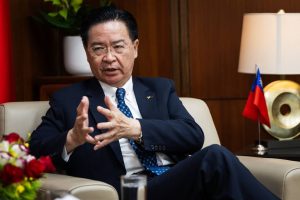On Monday night, Taiwanese Foreign Minister Joseph Wu delivered a talk at La Trobe University in Melbourne. Due to Taiwan’s unique status in international affairs, outreach and engagements like this serve an important purpose in explaining Taiwan’s interest and perspectives, and building empathy and international cooperation that can serve as a bulwark against China’s attempts to absorb the territory. Australia is seen by Taiwan as a key player in constructing this resilience.
In 2016, Taiwan launched its New Southbound Policy. The policy was designed to strengthen Taiwan’s relationships with the 10 countries of the Association of Southeast Asian Nations (ASEAN), six states in South Asia, Australia, and New Zealand. Its objective, alongside enhancing shared prosperity, is to build mutual interests and habits of cooperation in Taiwan’s near region that hinge upon its remaining an open and democratic society.
As one of the more long-standing and stable democratic societies within the countries targeted by the New Southbound Policy, Australia plays a central role in advancing these aims. Although Australia has no official diplomatic relationship with Taiwan, it has a strong network of unofficial and semi-official cooperative mechanisms that place Taiwan well within Canberra’s circle of friends. Given that Northeast Asia is the dominant region for Australian maritime trade – including Taiwan as Australia’s seventh largest trading partner – the stability of the region is a vital national interest for Canberra.
In the foreign minister’s remarks, Wu highlighted that Australia was an important actor for protecting “a free, open, inclusive, and resilient Indo-Pacific region.” In particular he highlighted Australia’s proactive role in enhancing the regional security architecture through initiatives like the Quad and AUKUS. Both welcome developments in Taipei that enhance deterrence of Taiwan’s overwhelming security concern: China.
Yet Wu was keen to stress that this deterrence is not simply a matter of military might and cooperative security partnerships; he noted that democratic resilience was also an essential element. This democratic resilience is twofold. It come from domestic populations having commitment to democratic principles, and this is buttressed by a network of international partners that share the same commitments. It’s important in this framework to make democracy – and its interdependent relationship with liberalism – global norms that governments, political parties, media outlets, and civil society groups are all dedicated to preserving and enhancing.
The foreign minister emphasized that “Taiwan, Australia, and other like-minded nations stand at a critical juncture. The forces of authoritarian expansionism are attempting to undermine our shared values of freedom, democracy, human rights, and the rule of law.” Wu noted that these forces are not a localized phenomena, but carry grave global consequences.
Wu also highlighted that due to Taiwan’s role as the dominant actor in the manufacture of semiconductors, its security is intrinsic to global security. The technologies we organize our modern lives through (and around) are dependent on Taiwan’s ability to remain an open, democratic society.
Yet the authoritarian expansionism that Wu warned of was not simply the threat of invasion of Taiwan by China, but also what Wu described as “cognitive warfare.” This is an incessant form of disinformation and gray-zone pressure that is designed to destabilize Taiwanese society and undermine the Taiwanese people’s faith and trust in their own institutions. With this, China is clearly failing, but as Taiwan heads toward elections early next year the tactics are becoming intense.
Wu noted that Australia had also been subject to these pressures, through attempts at economic coercion and hostage diplomacy. Although he didn’t mention it, disinformation on WeChat was also influential within the Chinese Australian community in the lead up to Australia’s recent referendum – with claims Chinese Australians would lose their homes or be deported if the Indigenous Voice proposal was adopted. It is likely that the Chinese Communist Party had a hand in spreading these narratives.
The broad concept that Wu was seeking to convey was that deterrence is a collective effort, not only through security architecture and partnerships, but through mutually beneficial trading relationships, educational and cultural exchanges, and the protection and enhancement of democratic norms. This network of interaction builds trust and resilience; it demonstrates an appreciation for pluralism and a rejection of unchecked power and authoritarian lusts.
In general, Taiwan’s foreign minister would naturally find a receptive audience for this argument in Australia, where the government has increasingly advanced an “all tools of statecraft” approach to Australia’s foreign policy. Taiwan knows that in the absence of conventional diplomacy it is the persuasiveness of its ideas that enables it to project influence, and so Wu needs to make compelling arguments each time he is afforded a foreign audience. Although the Australian government avoided any direct contact with the foreign minister, it undoubtedly paid close attention to what he said.

































